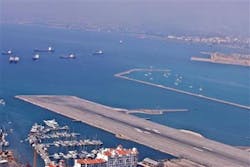New Agreement to Increase Access to Gibraltar's Airport
Esmeralda Valerga lives in Spain and commutes to work in her native Gibraltar, enduring a slow-motion nightmare at border control each morning and afternoon. If she wants to get on a plane, there's only one destination available: Britain.
But a historic agreement reached this week between Britain, Gibraltar and Spain could make Valerga's life a lot easier, and is expected to breathe new life into a disputed colony that is a throwback to the once-mighty British empire.
The accord announced Monday calls on Spain, which claims sovereignty over the Rock, to ease access into and out of the British colony at its southern tip.
Gibraltar's airport - until now serving only a few daily flights to and from Britain because of Spain's restrictions on use of its airspace - will open up to Spain and points beyond. Not everyone in Gibraltar is thrilled, but Valerga is.
"For me the deal is great. It'll mean more work, more money and a faster ride home after work," said the scooter-riding Valerga, who works as a waitress in Gibraltar.
Under other clauses of the accord - in which Gibraltar took part as an equal-status negotiator for the first time - London is to cover the unpaid pensions of thousands of Spaniards who worked in Gibraltar and lost their jobs when Gen. Francisco Franco shut the border in 1969. It was not fully reopened until 1985.
Spain is to allow more telephone lines into the colony of 28,000 people - fiercely protective of their Britishness - and will be allowed to open up a cultural institute in Gibraltar, flying the red-and-yellow flag there for the first time since the 1950s.
Even as Spain and Britain hail the accord as heralding concrete improvements in people's everyday lives, some in Gibraltar are wary. They fear Gibraltar may have let in a Trojan horse because Spain has not renounced its claim to the Rock. Britain seized it from Spain in 1704 and Spain ceded it by treaty in 1713, but has been pressing since then to get Gibraltar back.
"Basically, and I think I speak for most Gibraltarians, I just don't trust the Spanish," said businessman Jose Bocio. "We think they will stop at nothing just to get Gibraltar back, and we will never agree to give up our independence."
Gibraltar is a British colony with a unique flavor - many like Valerga trace their roots to Italy, Malta or Portugal, countries which sent traders here centuries ago to supply the British naval base - and has largely run its own affairs since 1964.
The city is a mishmash of streets patrolled by British 'Bobby' police in traditional black helmets and uniforms, pubs that look they were shipped over from London and narrow alleys with Arab groceries and kebab restaurants.
Britain has used the Rock as a naval outpost for centuries because of its strategic location: at the eastern end of the Strait of Gibraltar, the waterway that links the Atlantic and the Mediterranean and separates Europe from Africa.
People here speak impeccable English and swear allegiance to Queen Elizabeth, yet they are also fluent in Spanish and point proudly to institutions such as an independent judiciary.
While locals like Bocio think Spain has played the nice guy in a tactic to get its way, others see a deal that treated Gibraltar as an equal party as a huge victory - a sign that old differences can be set aside for the sake of a more harmonious future.
"I'm delighted," said opposition politician Charles Gomez. "I don't usually get a chance to congratulate the Gibraltar government, but for the first time in history they have got us recognized."
Gibraltarians say that for too long they have lived under a siege mentality. They remember Franco's closure of the border, which forced Gibraltar to fly in food from Britain.
These days radio stations here broadcast border-delay updates just like weather reports. Spanish police manning the border often slow things down to press Madrid's claims to the Rock.
And Gibraltar is so small that whenever planes land or takeoff, the only road to the outside world - to Spain - has to close because it goes right across the runway.
Until now the only commercial flights permitted to travel to Gibraltar are from Britain. In order to fly over Spain, pilots have to ask for permission to fly to Malaga, 120 kilometers (80 miles) east. Once close to Malaga they have to request permission to land in Gibraltar. If bad weather stops a landing on the Rock, the flight cannot return to Spain and must go to Portugal or Morocco.
"I know people who have had to make three attempts to get to Gibraltar from Britain," said businessman Alf Vasquez.
For international travelers, an airport deal and a more porous border will open the doors to investment, said business consultant Peter Hulme. "I expect to see an upturn in acquisitions in Gibraltar, especially in the area of tourism and gambling-related businesses," said Hulme.
Wherever you go in Gibraltar, history is not far from view. References to the Rock as a symbol of the one-time solidity of the British empire abound.
"Lieutenant William Forster, late of his majesty's ship Colossus, died of wounds received in the glorious battle of Trafalgar," reads a tombstone dated 1805 in a tiny graveyard in the city center. Right by its side, a Barbary monkey - a species native to the Rock - eats from a bag of chocolate candy.
News stories provided by third parties are not edited by "Site Publication" staff. For suggestions and comments, please click the Contact link at the bottom of this page.

